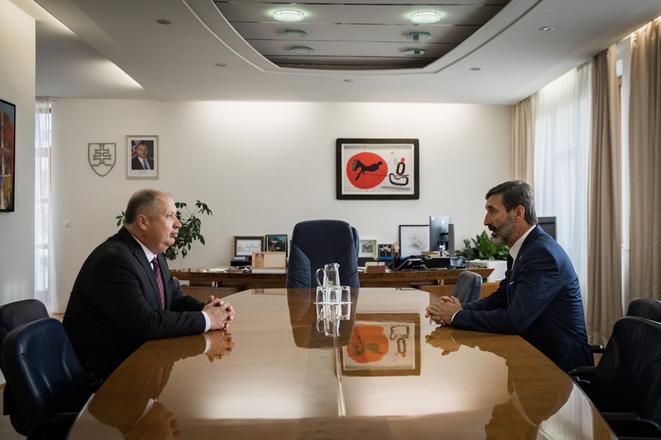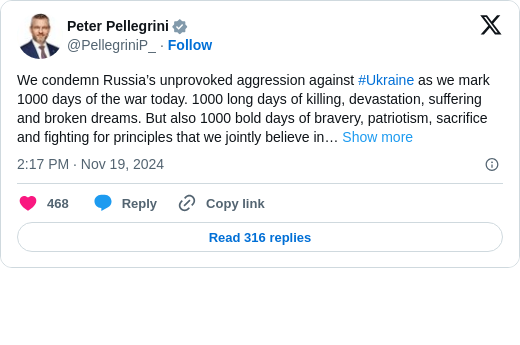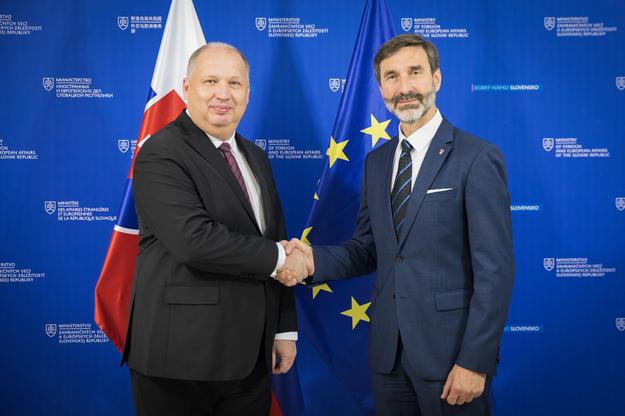On Tuesday, President Peter Pellegrini presented the credentials to Slovakia’s new ambassador to Russia, Peter Priputen.
“You are departing for what is likely the most challenging destination in our geopolitical region,” Pellegrini told Priputen during the ceremony. “To a country that has been waging war against Ukraine for more than 1,000 days, violating numerous principles of international law that Slovakia has long upheld.”
The president emphasised the importance of initiating international talks on a just peace. Pellegrini, who won the presidency earlier this year partly due to a campaign branding his rival, former diplomat and foreign minister Ivan Korčok, as a “candidate of war,” recently marked the 1,000th day of the war with social media posts. While he shared an English-language post on X and a Slovak video on the Ukrainian embassy’s Facebook page, he did not share them on his Facebook profile, where he has nearly 350,000 followers—a decision that drew criticism.
In his Tuesday remarks, Pellegrini underlined that Russia cannot be ignored. After the war in Ukraine ends, it will be crucial to re-establish dialogue, particularly in energy cooperation, the president added. Slovakia remains partially dependent on Russian supplies. This dialogue will also be vital for Slovakia’s bid for a non-permanent seat on the United Nations Security Council (2028–2029), Pellegrini said. Russia is a permanent Security Council member.
Priputen previously served as ambassador to Russia from 2014 to 2020, a period marked by his significant contacts in Moscow. According to Pellegrini, Priputen’s familiarity with the country is an asset, enabling him to engage pragmatically while upholding Slovak interests and values. Reappointing the same individual as ambassador to the same country is uncommon.
Prime Minister Robert Fico, who led the government during much of Priputen’s earlier tenure, reportedly valued his work. In August 2016, Fico secured a meeting with Russian President Vladimir Putin within days to support then-Foreign Minister Miroslav Lajčák’s bid for UN Secretary-General—a campaign that ultimately ended in defeat.
However, Slovak-Russian relations experienced a rare strain in late March 2018 when Priputen was temporarily recalled to Bratislava in solidarity with the United Kingdom. By then, Robert Fico was no longer prime minister, having been forced to resign earlier that month following the murder of journalist Ján Kuciak and his fiancée, Martina Kušnírová, which sparked massive protests. He was succeeded by Pellegrini. The diplomatic against Russia followed accusations that Russian agents had poisoned former double agent Sergei Skripal and his daughter in Britain. Priputen later returned to Moscow.
Several coalition politicians, including Russia-friendly Fico, are planning trips to Moscow.
Slovak Foreign Minister Juraj Blanár met Priputen on Monday, November 25, emphasising the need for pragmatic cooperation with Russia. “While we work on diversification, it is in Slovakia’s interest to maintain existing transit corridors for these commodities,” Blanár said, referring to energy supplies.
Priputen will succeed Ľubomír Rehák, who has been Slovakia’s ambassador to Russia since December 2020, during the tenure of self-proclaimed anti-corruption champion Igor Matovič as prime minister and Zuzana Čaputová as president.


 Peter Priputen (l) talks to Foreign Minister Juraj Blanár. (source: Foreign Affairs Ministry)
Peter Priputen (l) talks to Foreign Minister Juraj Blanár. (source: Foreign Affairs Ministry)

 Diplomat Peter Priputen (l) and Foreign Minister Juraj Blanár (r) shake hands. (source: Foreign Affairs Ministry)
Diplomat Peter Priputen (l) and Foreign Minister Juraj Blanár (r) shake hands. (source: Foreign Affairs Ministry)